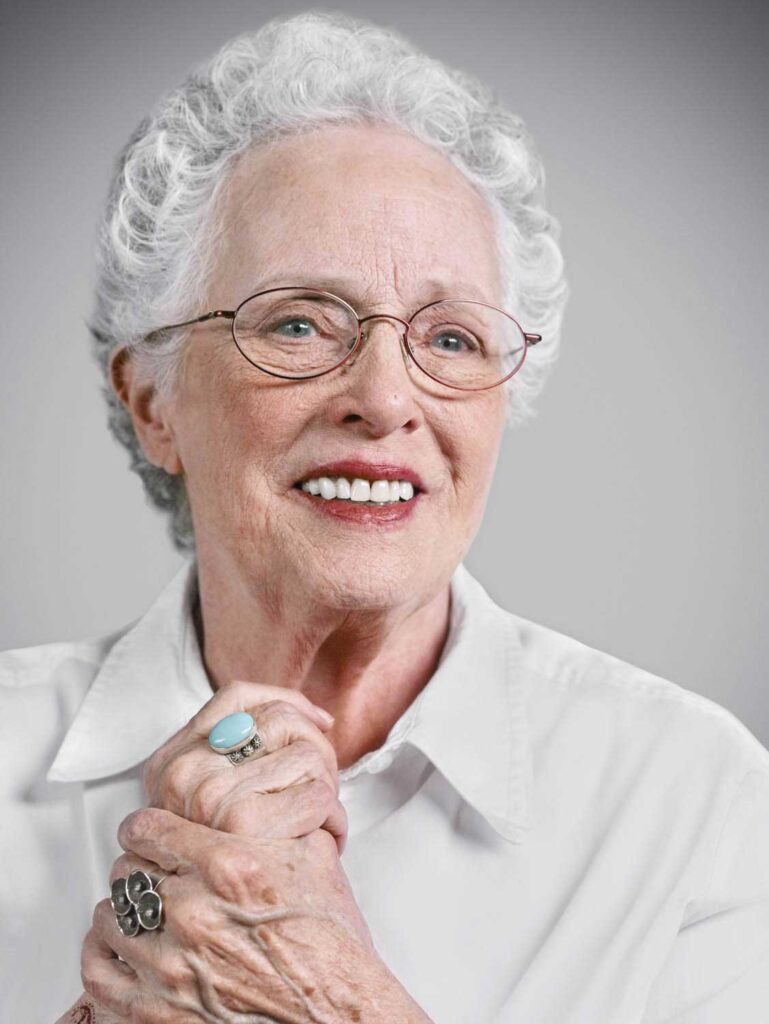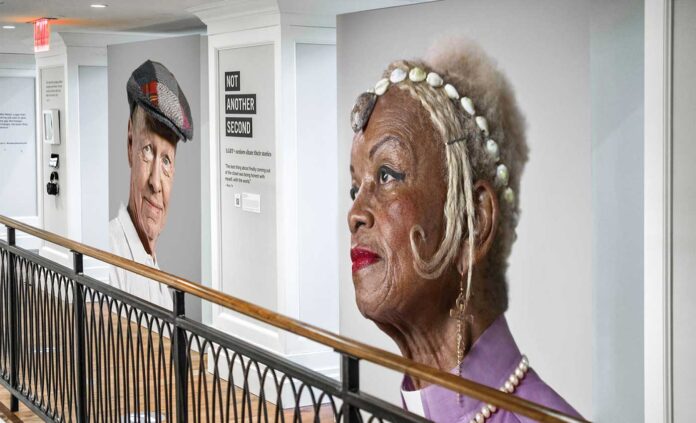Not Another Second, a recently opened exhibit and short film in New York City, celebrates the lives of LGBT+ seniors with a collection of photographs and interviews. The people discuss the years they lost in the closet and how they have lived their lives after coming out, deciding there was “not another second” to lose to homophobia, transphobia, and other forms of discrimination. The exhibit was produced in conjunction with the Watermark Retirement Communities, and is being hosted in their Brooklyn Heights location through May before moving to the west coast.
“Up to 3 million American seniors identify as LGBT+. That number is expected to more than double by 2030,” the short film reminds us at the opening. The stories of twelve such people are told through this exhibit.
“So, there was a part of me that wanted to be a traditional gal,” shared 78-year-old Philadelphia native Ellie Starer. Initially, she thought a traditional lifestyle was her path, and that marriage might help her secure a ‘normal’ life. “I remember thinking early-on I would never go into a gay bar.”
In 72-year-old Lujira Cooper’s case, she was always open about her sexuality, but found discrimination due to other parts of her identity. Living in New York City during the time of Stonewall, she said she felt more acceptance as a lesbian than she did as a Black woman.
“I faced more problems being a Black woman, than I did as a lesbian,” Lujira shared with the filmmakers. She also cautions that the LGBT+ rights we have gained can just as easily be taken away.
“I think it’s a continued fight. I think young people need to realize that we could… go backward. They’d be fired from jobs, discriminated against in housing and health care, all the things that we fought to eliminate, could come back.”

For those unable to see the exhibit in person, the stories of the seniors are available virtually, along with photos by German-based photographer Karsten Thormaehlen, a short but poignant film, and a timeline of LGBTQ rights. In addition, a coffee table art book with over 100 images and extended stories shared by the subjects is also available.
“My aim as a photographer is to bring out or enhance some sort of inner beauty in people who I think suffer from discrimination,” Thormaehlen shared from his home in Berlin. “This is because of their look, ethics, origin, age and in this case sexual orientation.
Sadly, those interviewed also reveal a fear of being outed and the ramifications it could bring them in previous decades. Up until 1973, homosexuality was considered a mental health illness by the American Psychiatric Association. That change was made less than 50 years ago.
Collectively, the 12 seniors in the exhibit lived 452 years of their life having to suppress their true selves.
Another interviewee, Richard, came out at 60. The exhibit shows him now with his husband, Ray. The couple knew early on they were right for each other, and they started making plans to move in together after a few weeks. Ray, an octogenarian, tearfully recounted his role with the US Navy, where he was tasked with discharging fellow sailors who were suspected of being homosexual. It wasn’t until he was older that he learned to let go of his fears.
“I grew up not trusting anybody with these sort of secrets that I kept hidden because I was afraid of… total rejection,” Ray says in the exhibit. “That’s a very painful thought. But there comes a time as you get older where you have your life to live and shed all this fear and anxiety over these things.”
In addition to the travails from one’s own journey, fear and anxiety can also come from a lack of understanding of other people, as Richard explained.
“I constantly remind myself to be forgiving of these other seniors that have never had any exposure to a gay lifestyle, or know any [gay] friends or family, and can’t grasp it. Many times when you can’t understand something, you begin to get a negative attitude toward it.”
Homophobia, transphobia, workplace and healthcare discrimination was and still is very much part of LGBTQ elders’ lives. But in addition, the freedom and acceptance they may have built with partners, lovers, friends, and roommates can also dwindle as they and other loved ones age or pass away. A 2016 article in The Atlantic highlights how seniors sometimes feel they are left with no choice but to “go back in the closet” as they age. This can arise when they seek retirement, assisted living, or nursing home communities.
“There are a myriad of issues that affect LGBTQ older adults today, including social isolation, housing insecurity, health disparities, and lack of access to LGBTQ-inclusive services and supports,” David Griffith, Program Director for the LGBT Elder Initiative based out of the William Way Community Center. “While there has been a lot of progress in these areas over the past decade, a lot of work remains to be sure that members of our communities are able to grow older with the services, care, and support that they deserve.”
To view the virtual exhibit, visit www.notanothersecond.com/.
